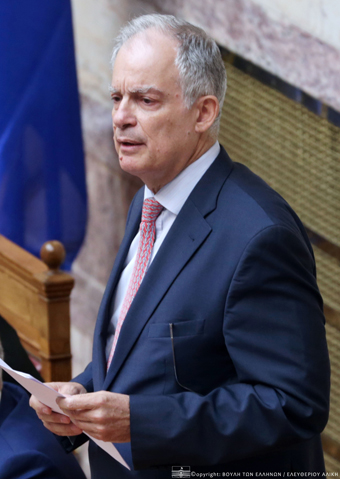Message from the President of the Hellenic Parliament, Mr. Constantine An. Tassoulas

Language contact, as a timeless, universal phenomenon arising from the interaction between different peoples or ethnic groups, is inherent in the very existence of language. There is no language, living or dead, without signs of borrowing, without influences from another—whether lexical or structural/grammatical. “All languages have been and continue to be shaped—at all levels—by their encounters, equal or unequal, with other languages,” A.-F. Christidis writes. Especially today, in the era of globalization, linguistic diversity and multilingualism constitute a common sociolinguistic condition, as most people worldwide speak more than one language, influencing the very evolution of linguistic systems.
The Greek language, throughout its long historical journey, has emerged as a pioneer in linguistic contact, both as a source language—lending thousands of words to other languages, especially in fields like scientific terminology—and as a target language, incorporating and assimilating terms from languages with which it has coexisted or by which it has been influenced over the centuries. Greek, as the bearer of an open, globalized, and influential culture, has never feared enrichment; likewise, its speakers, scattered around the world, have always adapted to new linguistic and cultural contexts while maintaining their connection with the homeland and the Greek language.
The 11th International Summer University “Greek Language, Culture, and Mass Media,” which will take place in Boston from May 24 to May 29, 2025, with the support of the Center for Training and Lifelong Learning (K.E.DI.VI.M.) of the University of Ioannina, brings the Greek language of the global Greek diaspora to the forefront as a Heritage Language. This refers to a language spoken in diaspora communities by immigrants and their children or, more broadly, by bilingual speakers who primarily use the language of the majority, but also know and use to some extent the language spoken in the country from which they or their ancestors migrated. Thus, Greeks living abroad and their descendants, although they have become integrated into their host countries over time, do not forget the Greek language as part of their cultural heritage and identity.
Furthermore, this year’s theme, “Diaspora Media: Challenges and Prospects,” highlights the crucial role played by diaspora media in America, Europe, Australia, Asia, and Africa in promoting the Greek language and culture worldwide. Through articles, broadcasts, and publications in Greek, these media outlets provide opportunities for members of the Greek diaspora to connect with their native language, practice it, and keep it alive. Additionally, they connect the diaspora with their roots, keeping them informed about current events in Greece and strengthening their engagement with Greek sociocultural realities. Naturally, they also contribute to enhancing Greece’s international cultural influence.
The Hellenic Parliament is joining this commendable effort to strengthen Greek language learning among the Greek diaspora through lifelong learning, placing the event under its auspices. The network activated by the International Summer University “Greek Language, Culture, and Media” is truly extensive, featuring prominent international institutions in education, culture, and media. The participation of directors and journalists from Greek diaspora media in America, Europe, Australia, Asia, and Africa, as well as academics and researchers from Greek and foreign universities and research centers, along with intellectuals and artists, ensures a multifaceted and dynamic exploration of a range of topics. These include the global presence of diaspora media, their contribution to contemporary Greek culture and the preservation and dissemination of the Greek language, representations of Greece in diaspora media, and potential collaborations within the framework of a global forum for Greek diaspora media.
Warm congratulations are due to the founder and academic director of the Program, Professor Nikoletta Tsitsanoudis-Mallidis, Professor of Linguistics and Greek Language in the Department of Early Childhood Education and Dean of the School of Education at the University of Ioannina, for her steadfast commitment to this successful academic initiative. Over the years, it has evolved into an established institution.
In conclusion, while the Greek language may have quantitatively fewer native speakers than other “dominant” languages of our time, its comparative advantage lies in its status as a global cultural treasure, with an unbroken oral tradition spanning 4,000 years, a written presence of at least 2,800 years, and a literary tradition with worldwide influence. As Roderick Beaton writes in his work Greece: Biography of a Modern Nation (Athens, 2021), “The Greek language, unlike any other linguistic culture, has formed the foundation of the Western world and has endured through time, leaving its mark on every significant period in the history of Europe and the Mediterranean.” This language, whether as native, or second/foreign, or as a heritage language, in all its forms and varieties, deserves our support in teaching and promoting its use by all means. In doing so, we contribute to the linguistic and cultural legacy of Humanity.